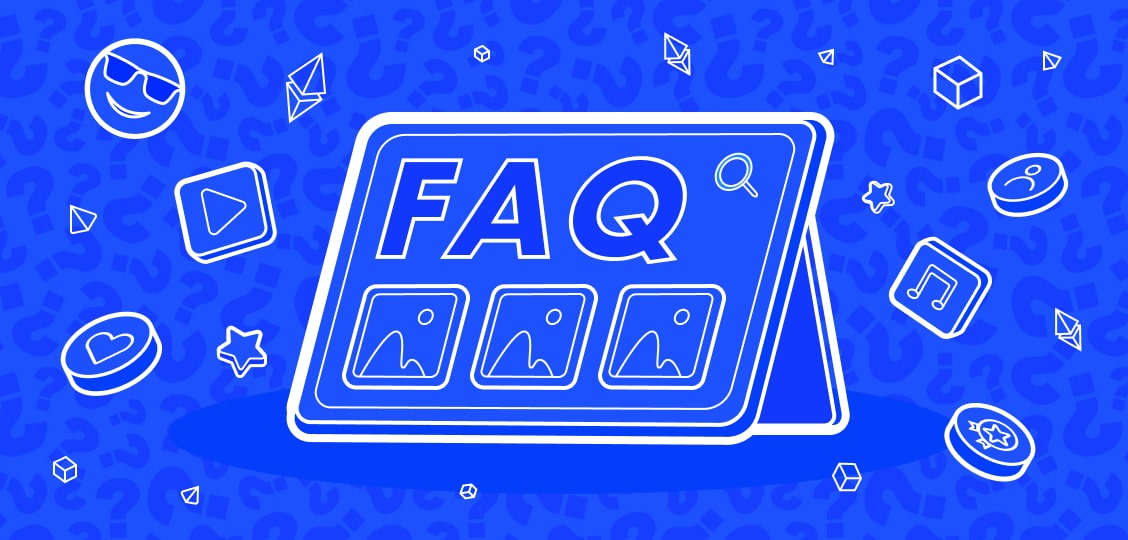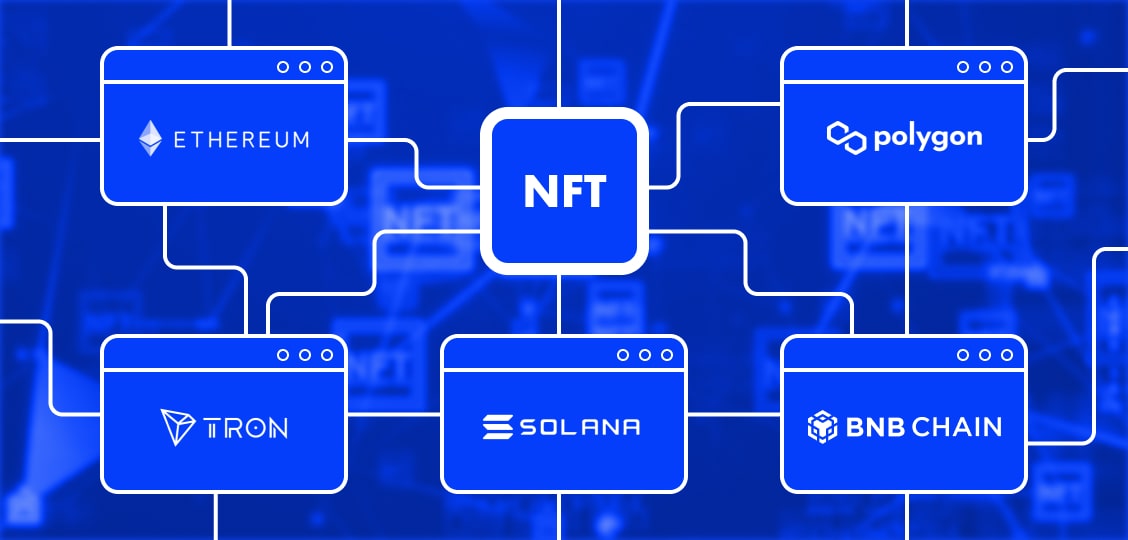Top 5 blockchain development platforms to build an NFT marketplace
The article describes the top 5 blockchain platforms to build an NFT marketplace app. Find out which blockchain will meet your business-specific needs.

Initially introduced in 2014, NFTs provide businesses and individuals with wild new opportunities to earn income, promote goods, attract an audience, and win recognition. With the growing popularity of non-fungible tokens, our company has been receiving many requests to build an NFT marketplace that will connect digital content creators with consumers. We are also often asked to estimate the cost and time necessary to make an NFT marketplace app.
However, not every client, even with a technical background, has a clear understanding of what a digital NFT marketplace is. Furthermore, NFT projects have their own specifics associated with blockchain technology and token standards. As a result, software engineers have to address various issues, from choosing a blockchain platform to minimizing transaction commissions.
In this article, we will provide the answers to all questions about digital NFT marketplace development that have ever bothered our customers. Continue reading to gain valuable insights and recommendations from Arateg’s software experts.
As all kinds of digital assets—i.e., gaming cards, virtual collectibles, certificates—can be tokenized and traded via a blockchain-powered NFT marketplace, brands across multiple sectors, like art, gaming, sports, music, and fashion can benefit from this innovation.
World-famous companies, such as Microsoft, Starbucks, Tesla, Nike, Gucci, Dolce & Gabbana, and Home Depot have already joined the trend. Celebrities are also introducing their own NFTs, for instance, Kings of Leon, Grimes, and Paris Hilton.
The time to create an NFT marketplace depends on multiple factors:
The cost of NFT marketplace development depends heavily on various aspects, involving:
Therefore, the end price may significantly vary. For example, to make an NFT marketplace similar to OpenSea but containing only a minimum set of features (sign in/up, search, shop window, auction, online payments, listing management, rankings, notifications, and an administrator panel), you should have a budget of at least $70,000–$210,000 to hire an IT service vendor asking for $20–$50 per hour. However, if you partner with a software engineering firm charging $150 per hour, the figure may amount to $630,000 or even more.
If you are wondering how to cut project expenses while saving end software quality, read our article on the topic.
Read our guide to learn more about building an NFT marketplace like OpenSea, which includes time and cost estimates, as well as describes a technology stack and monetization strategies.
A white label NFT marketplace is initially created by a third-party contractor and has basic features. After purchasing an NFT marketplace application, you rebrand it according to your business style and goals.
For this purpose, white label NFT marketplaces generally provide built-in functionality for changing colors, fonts, and text size, as well as moving design elements. Thanks to this, you manage to significantly cut costs and time to market.
At Arateg, our software engineers tailor a white label NFT marketplace app for each client individually (modifying the user interface, delivering new features), thereby ensuring the highest level of customization.
The custom approach, in turn, offers plenty of other benefits. First, you can make an NFT marketplace according to any specific requirements. Second, you get the possibility to develop the strongest brand identity. Third, you improve the security of a software product. Nevertheless, this option is much more expensive and resource-consuming.
If you want to choose the best model for your project, read our article that compares custom development and white labeling.
If you are looking to build an NFT marketplace similar to a well-known product, say, OpenSea, Rarible, SuperRare, Foundation, NBA Top Shot Marketplace, Foundation, or Veve, our software engineers are capable of creating it from scratch.
In order to choose a blockchain platform properly, it is important to take into account a range of factors. They encompass the amount of transaction commission, transaction speed, token development cost, security level, functionality, and forking possibility.
High transaction commission is among the key NFT marketplace development challenges. In the Ethereum network, for example, users have to pay gas fees for utilizing the computing energy required to validate and verify transactions.
The supply and demand between miners determine the gas price. If the remuneration is not sufficient, miners can decline to process a transaction. So, gas commission can account for hundreds of dollars, leading to low user retention, engagement, and conversion rates. This way, building an NFT marketplace on Ethereum may be unprofitable.
With the view to reduce transaction commission, it is possible to make an NFT marketplace application on another blockchain, for instance, Polygon. This platform was designed to eliminate the issues of Ethereum while preserving its valuable features. In fact, gas fees on Polygon generally reach just $0.01.
Non-fungible token standards describe how to develop NFTs on a certain blockchain protocol. Each blockchain has its own NFT standards. Picking an NFT standard is crucial to meet end-user expectations and boost engagement. Let’s consider an example of how to choose an NFT standard for an online marketplace platform based on Tron.
When making an NFT marketplace app on Tron, software engineers utilize TRC-721 or TRC-1155 standard.
TRC-721 enables content creators to design a single NFT that cannot be copied by third parties. Representing a multi-token standard, TRC-1155 allows digital asset holders to introduce as many of the same NFTs as they need to.
In order to determine the best standard for your project, it is important to start by identifying the goals of the target audience. It is also reasonable to conduct competitor analysis.
Our project manager, business analyst, and NFT marketplace developers will communicate with you throughout the entire project to discuss the required issues, demonstrate intermediary results, and make recommendations. You will be able to directly approach each member of the team to ask questions and request the necessary information.
With the view to achieve process transparency, you will be provided with access to all project aspects, involving a product delivery roadmap, reports, documentation, dynamic prototypes, code repository, time tracking (Jira) and project management (Trello) systems. Additionally, our software experts prepare daily and weekly reports. To establish effective collaborations with our clients, we also hold regular in-person and virtual meetings.
NFT marketplace development is a complex process that requires resolving multiple challenges. When knowing the specifics of building NFT marketplace apps, you will be able to faster determine product specifications and establish effective cooperation with a software engineering firm. In case you have other questions about NFT marketplace software, do not hesitate to send them to us, so that we include answers in the article.
If you aim to launch an NFT marketplace, you are welcome to contact our team. We will get back to you in 1 business day and help address all issues. Project consultation is for free.
With extensive experience in creating NFT marketplace platforms, we can provide assistance in conducting competitor analysis, choosing a technology stack, prioritizing features, and outlining a roadmap for delivery. Our software experts can also estimate the approximate budget for making your NFT marketplace solution.

The article describes the top 5 blockchain platforms to build an NFT marketplace app. Find out which blockchain will meet your business-specific needs.

Find out how to build a peer-to-peer marketplace, from prioritizing features and choosing a technology stack to estimating a budget for project implementation.
Now, you will receive a fresh newsletter from us.
Get the latest scoop on software application tips, announcements, and updates from us. Subscribe to our newsletter!